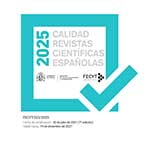More than One and Less than Two. The Essential Predicates and the Fold in the Village of Zaña, Peru
Abstract
This study is based on fieldwork carried out in the town of Zaña, located on the northern coast of Peru, which is conceived by the local inhabitants (zañeros) as a "mestizo town"; composed of blood from four continents: America, Africa, Asia and Europe. Thus, starting from the ethnographic events experienced in Zaña, I will seek to analyse the notion of "cruce" ("junction" or "intersection") understood as a concept and primary operation that –as operated by the Zañeros– refers to a miscegenation that instead of homogenisation points towards a cohabitation of heterogeneous intensities. It is from this notion and from this heterogeneous treatment of mixture that ontological openings will be explored to help us redefine the following Western categories involved in the process of miscegenation: "body", "soul", "manners" and "customs". Finally, through this case study and the problematisation of these four categories, a way out of the antinomy between the two canonical academic characterisations of mestizo peoples - either they are peoples who have undergone a process of homogenising mixture or they are peoples in which multiple cultures interrelate - can be resolved if we consider the temporal and ecological dimensions of the beings, human and non-human, that make up the land of Zaña.
Downloads
Article download
License
In order to support the global exchange of knowledge, the journal Revista Española de Antropología Americana is allowing unrestricted access to its content as from its publication in this electronic edition, and as such it is an open-access journal. The originals published in this journal are the property of the Complutense University of Madrid and any reproduction thereof in full or in part must cite the source. All content is distributed under a Creative Commons Attribution 4.0 use and distribution licence (CC BY 4.0). This circumstance must be expressly stated in these terms where necessary. You can view the summary and the complete legal text of the licence.









